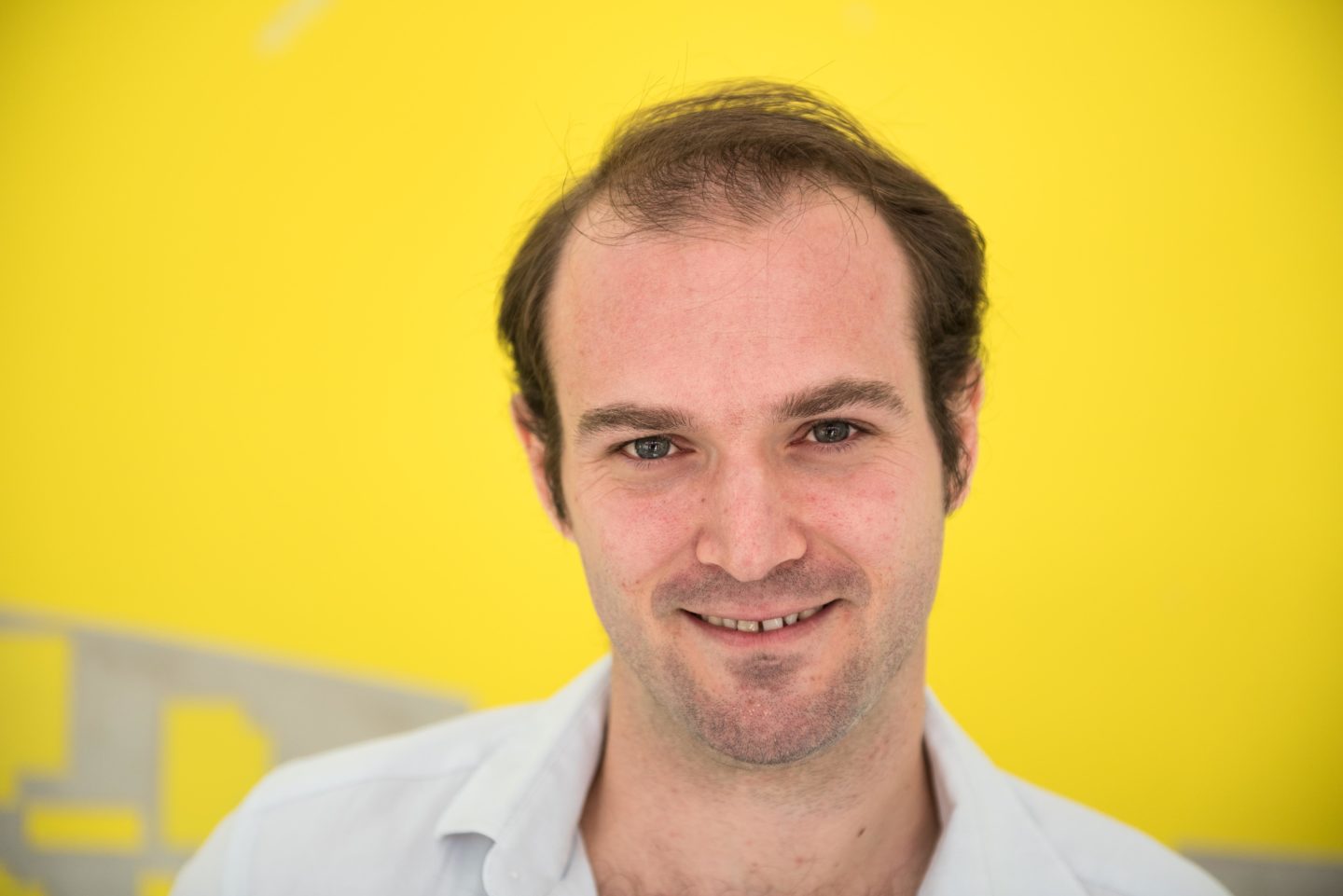
MAX PLANCK INSTITUTE FOR INTELLIGENT SYSTEMS, TÜBINGEN, GERMANY
Michal Rolinek was a PhD student at IST Austria. He now works as a postdoc at the Max Plank Institute for Intelligent Systems. At IST Austria Michal Rolinek was in the Kolmogorv Group.
He returned to campus as a speaker at the Science Industry Day 2018 and found the time to give an interview and answer some interesting questions about his work.
Watch the corresponding video on YouTube
I don’t have a business card but if I had one it would say that I am a postdoc at the Max Plank Institute for intelligent systems.
In our group, we are trying to connect new methods for artificial intelligence and to connect it with the world of robotics. And the coolest thing is that we have a whole floor of robots.
I don’t have a particular plan right now. Luckily we live in the days where there are amazing opportunities for computer scientists so I will just wait and see where they take me.
I got my master’s degree in Prague in mathematical analysis and here at IST, I got my PhD in theoretical computer science.
IST played a massive role for my career. I am really happy to say that the opportunities that I have right now are nothing I was imagining three or five years ago and if you told me I would not have believed it.
One, learn as much as you can about as much as you can. I think that IST is a great place for learning no matter which position you are holding here.
Two, be compassionate the academic environment can be very pressurizing and stressful and the sources of stress can be often different for different people so it is hard to relate. Care for the wellbeing of your coworkers and they will do the same for you.
Three, do it for the joy. I think that joy is the best motivation to do science or to do anything really.
I have had so many great memories. I had a great time in our office and playing football great time at retreats. But if I were to pick one it was the few boxing matches I had in the lecture hall.
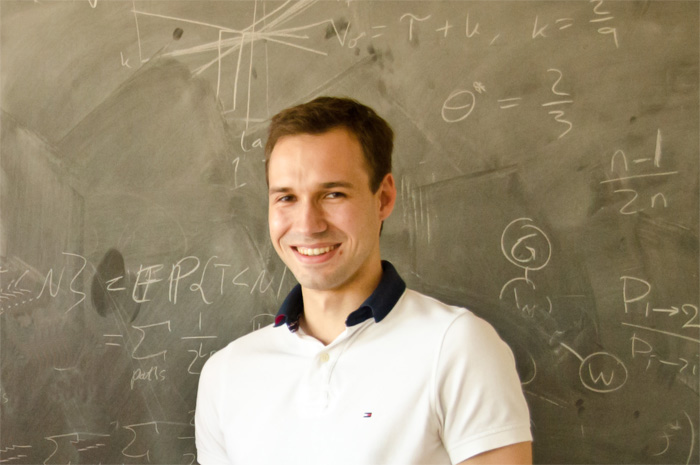
MY RESEARCH LIES AT THE INTERFACE OF COMPUTER AND BIOMEDICAL SCIENCES AND FOCUSES ON THE STOCHASTIC PROCESSES UNDERLYING EVOLUTION. I DEVELOP COMPUTATIONAL METHODS TO LEARN FROM LARGE-SCALE BIOLOGICAL DATA SETS AND BUILD MATHEMATICAL MODELS TO EXPLAIN OBSERVATIONS ON A MECHANISTIC FASHION.
MOST RECENTLY, I FOCUSED ON INFERRING THE EVOLUTION AND THE SEEDING OF METASTASES IN PANCREATIC CANCERS.
Johannes Reiter returned to campus in Fall 2018 to give a special Think and Drink and to share his research with the current campus community. He also found time to do a video interview with us.
Watch the corresponding video on YouTube
I don’t really have a business card but if I had one it would say Johannes Reiter instructor at the Canary Center for Cancer Early Detection at Stanford University School of Medicine.
The coolest thing is that I can work on a globally really important disease. I work on tumors and specifically tumor evolution. I try to approach this problem from a mathematical perspective I try to come up with a quantitative framework that can describe the evolution of cancer.
In the future, I still want to be at the interface of multiple fields like computer science, biology and medicine. I also want to do research in academia perhaps also together at a medical school or a hospital and work together with various researchers from these various disciplines.
My background is in computer science, originally I actually did computer engineering. Then I did computer science at the Technical University in Vienna. When I came to IST I wanted to stay in computer science but I kind of got into theoretical biology and towards the end, I got more into cancer evolution and combining data analysis and mathematical modeling.
IST played a really important role in my career because before I started here I saw myself as an engineer and not as much as a scientist. But then when I started my PhD here I got introduced into so many different areas and I got interested in areas outside of computer science and outside of computer engineering. And that is also the most interesting thing about my job currently. That I can work with experts from various different fields and that keeps my job interesting.
My advice would be: think critically and deeply, try to become independent and ask your own questions, very early on in your career. And perhaps do an internship in industry so you have a good comparison between research that is happening in academia and research that is happening outside of academia.
My favorite memory of IST are definitely all the table soccer games which we played for a lot of time basically every day after lunch.
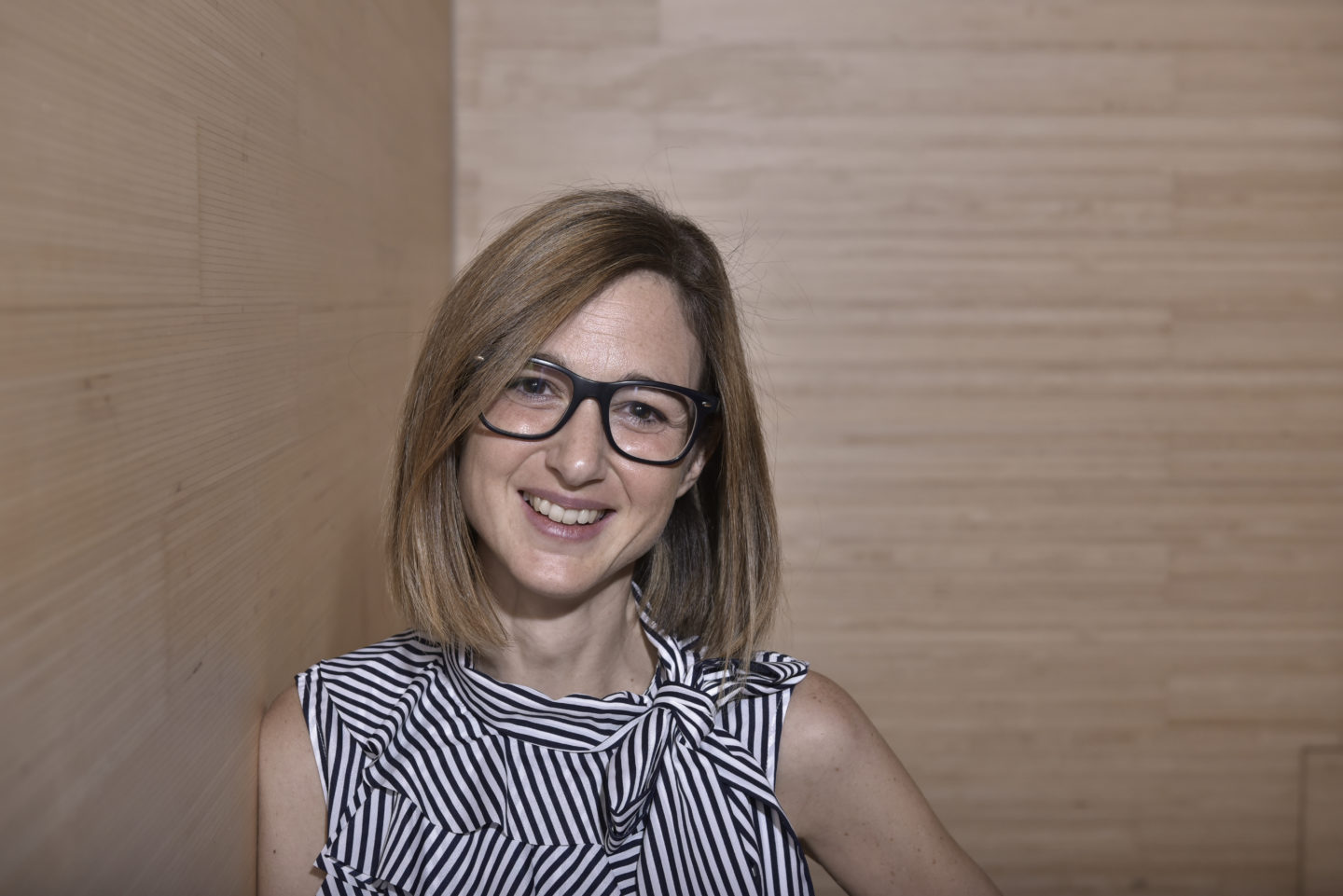
Inma Sanchez Romero was a Postdoc at IST Austria. She now works for the research Services of the University of Vienna, as an Assistant Project Manager of the INDICAR (Inter Disciplinary Cancer Research) Postdoctoral Fellowship Programme of the University of Vienna and the Technology Transfer Office. At IST Austria Inma Sanchez Romero was in Harald Janovjak’s group.
In an interview with Daniela Klammer and Kathrin Pauser which took place during the Science and Industry Day 2017 she answered some interesting questions about her work and her decision to switch from a scientific career to supporting science in a different way.
I work in research project management at the University of Vienna. Specifically, I work for a postdoctoral fellowship program called INDICAR (INterDIsciplinary CAncer Research), which is co-funded by the EU Framework Programme 7 (FP7) Marie Curie Actions.
So, on my business card it’s written my name, Ing. Inmaculada Sanchez Romero, PhD, and my position, INDICAR Assistant project manager.
My job is to support the INDICAR program and its fellows by looking for funding opportunities, writing and submitting proposals, and organizing outreach activities to disseminate information about our program and our fellows’ research. For example, I organize workshops to develop and strengthen our fellows’ skills.
There are two things that I really like about my job. One of them is organizing workshops and scientific events. And the second is that I like to think that I can have a positive impact on our fellows’ careers by looking for funding opportunities for them or by contributing to their professional development, by organizing workshops and outreach activities.
I think there are only a few positions in research project management. Once the transition is made, your professional profile becomes very specific. That might be a problem when looking for a position in another country or at another company.
I see myself working in research project management in an academic environment managing a research program and supporting its fellows.
I studied chemical engineering at the University of Granada in Spain, where I also did my masters in biotechnology. Then I obtained my PHD in chemistry working on protein engineering at the University of Granada in collaboration with Columbia University in New York, where I had three short-term research visits, and the Danish biotech company Novozymes Then later I did my postdoc at IST Austria working in synthetic biology in the Janovjak lab.
Besides all the support in scientific research at IST, I had the opportunity to collaborate and plan and organize scientific events. As a result, I explored and developed my organizational and management skills. That made me realize that I wanted to focus my career in that direction.
Work on your career development to obtain a good-sized set of transferable skills, not only by participating in workshops, but also by getting experience through volunteering, for example by organizing scientific events. Here at IST Austria there are a lot of opportunities for that.
The second one is to network, to attend conferences and workshops, to talk to people and create a solid network of contacts.
The third one is for people who are considering leaving academia. I would like them to know that they shouldn’t be afraid of the unknown. That leaving academia doesn’t mean that they have failed. It just means that they have other interests. It takes a lot of courage to follow your dreams and leave your comfort zone and to be willing to explore other possibilities.
One of my favorite moments at IST Austria was at the Young Scientists’ Symposium. I was part of the organizing committee. After all the work and all the effort organizing, it was amazing to see that it was something real. That it was happening and everything was working perfectly. The speakers and the attendees were really satisfied with the event. It was a rewarding moment and an amazing experience.
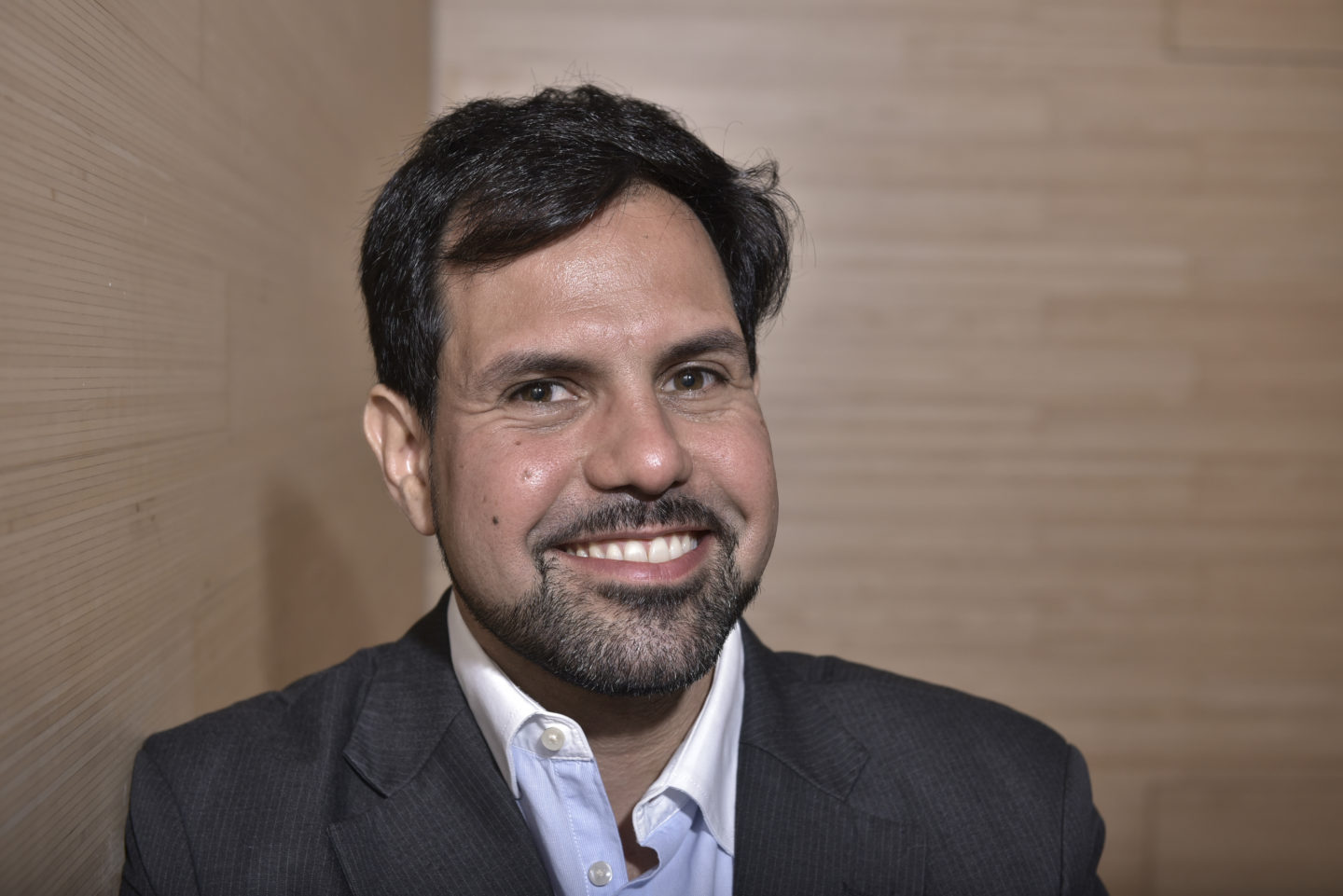
Harold De Vladar was at ISTA from 2009 to 2013 as a postdoc in the Barton Group. He is now CEO and founder of Ribbon Biolabs GmbH. In an interview with Daniela Klammer and Kathrin Pauser which took place during the Science and Industry Day 2017 he talks about what he likes about his research but also about his career and about his time at ISTA when the institute was still very small.
Harold de Vladar, my position: CEO and the name of my startup which is Ribbon Biolabs GmbH.
The essence of my job is to develop the technology to secure the IP of the technology and also to consolidate and make sure that the team is on a good track to develop the technology.
The limitations is that once you start with your own startup you have less freedom to do other things and when you come from an academic background you are probably excited about so many things and then you find yourself restricted doing stuff that you didn’t want to do in the first place like financial sheets or business plans. Which you have to do but what you want to do is just do experiments and equations’ stuff. The cool thing is that you are working for something that is entirely yours. It’s not like working for an institute for two years and after the two years that’s it. It is money you get and you construct your own stuff so it is yours. You develop it as you want you do exactly what you want it is your decision what you are doing and that rocks.
I want to develop this company obviously and I want to be in a position where I am developing new ideas new products or solving new problems related to science. So tech transfer if you wish but real problems and I want to do things that are a bit non canonical, not the standard things. I know it sounds a bit abstract but biology is very vast. There are many interesting things there that you can actually take and make a product out of it for a specific purpose. This is the things I like to make. I would also like to keep a bit of research going like basic research or more explorative research in order to allow the serendipity factor to come to new possibilities.
It’s a complex one. I started as a cell biologist and statistical physics at the same time. Then went into applied math’s only to get more formal tools to work with my stuff related to genetics and evolution. Then I did my PhD in evolutionary ecology, actually I did my PhD in evolution in a group of evolutionary ecology which is what let me to Nick Barton and that is how I ended up at ISTA. And I also have a degree in art and science which sounds very disconnected to all this but it is not.
First of all the connectivity how I connected to the people here which are now in different places either because they were postdocs or because they were exprofessors from here in some other places this allowed a lot of connections directly or indirectly. That was something very important.
And what was also crucial. Having worked with someone like Nick Barton this was an amazing endorsement. We did great job Nick and I, what we did was awesome. It was not on the side of being extra productive but more on the side of taking very challenging problems and solving them. So it was not like salami slicing papers and that created a very idiosyncratic way of seeing science for me because I always gave more importance to this aspect than to publish many papers something that many universities don’t like.
So ISTA determined my career in these two ways in the way I see it but also which options do I have but not by restricting them but by me realizing what is it what I want to do. I always felt more comfortable in Institutes of advanced studies small places where you can think of new things rather than the big shot universities where people go mad with the latest nature cover and you have to race with them. That’s not my style.
For the postdocs of ISTA: Things have probably changed a lot since I left ISTA but I think there are two levels of things that you have to learn as a postdoc. First of all you have to do your work project as it means of learning maturing etc. but you also have to keep a close eye on what you want and what are the next career steps. You can get very distracted with your project and forget that there is a future that you have to fulfill. And I saw many postdocs forgetting these things.
Second, I feel like there is a lot of gab between what is a postdoc and what is a professor and ISTA doesn’t give this feeling of continuity between one and the other. I think at least in my time it was great to be here as a first postdoc but not as a second because you won’t have that much independence you won’t have that much support beyond your project.
I think it was one of these barbeques and we went into the pond, swimming in the pond. I don’t think Tom Henzinger was so happy with us the next day. This was when ISTA was relatively small. We could have staff meetings of the whole institute every week and these meetings didn’t get to more than 20 people. None of the building existed. That was very fun.
Very simple what kind of problems do I really want to solve and how.
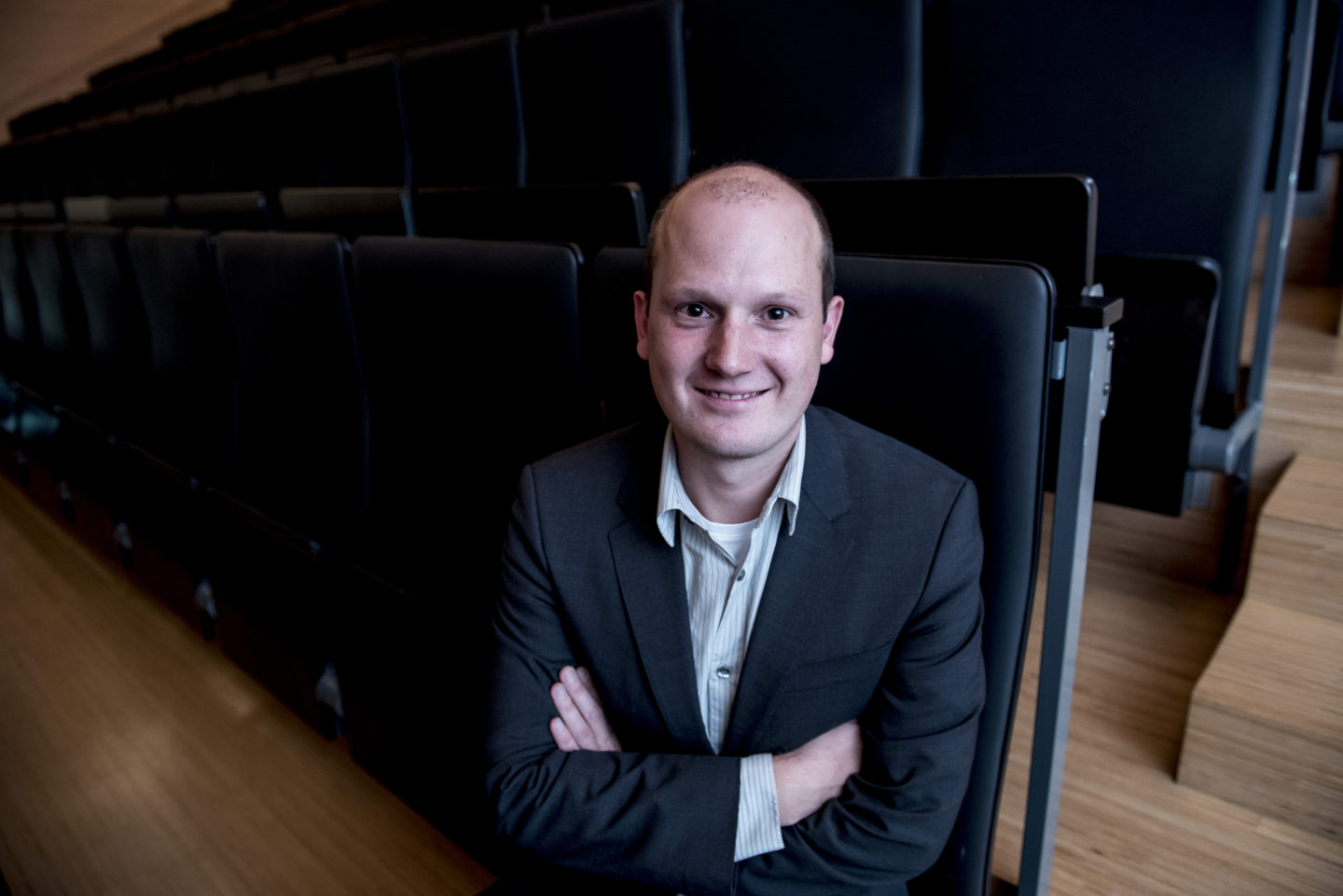
Stefan Huber was at IST Austria from 2013 to 2015 as a postdoc in the Edelsbrunner Group. He is now a researcher at Bernecker + Rainer in industrial R&D. In his interview, he talks about his research but also about his career and about his time at IST Austria.
Stefan Huber, Research and Development
I designed the software concept that means the algorithms, the mathematical models for the next generation industrial transport system of B&R which is called ACOBOStrak.
The coolest thing I think is: It is a very interdisciplinary project. There are bright people from control theory, from mathematics, computer science and together we shape a new kind of technology that could actually change the way industrial machines are built in the future.
I believe that the current R&D project I am working on kind of demonstrates how computer science has a deep impact on industrial automatization. I think this is only a start so in the future I would like to shape a stronger group in the company that focuses on computer science algorithms and mathematics.
My academic background is actually algorithms more precisely it is computational geometry and topology so I have a double degree in computer science and mathematics. I studied in Salzburg I did my PhD in computational geometry and then for a short time I was a senior scientist at the math department. After that I joined Herbert Edelsbrunner’s group at IST Austria for two years in computational topology.
To me IST Austria was intellectually very inspiring. So looking back at IST I see that the experiences that I gained at IST gave me a lot of confidence and trust in scientific principles and that again has an influence in my work because I know that I can trust on scientific methodologies to solve the problems I face in my industry job.
First actively participate in intellectual exchanges.
Try to go to as many workshops and conferences as you can do.
And third use the freedom and opportunities you get from IST Austria. In my case I wasn’t forced to pursue a particular direction in my research. So that’s a nice thing you are completely open. They are very generous when it comes to visiting conferences and there are a lot of scientific visitors to get in touch and to have discussions after a talk when drinking a glass of wine or going to Heurigen.
What I really loved was when there were big visitors like Steve Smale and we went to Heurigen for dinner in the evening and the kind of talks that developed at an evening event are quite different and I enjoyed that very much.
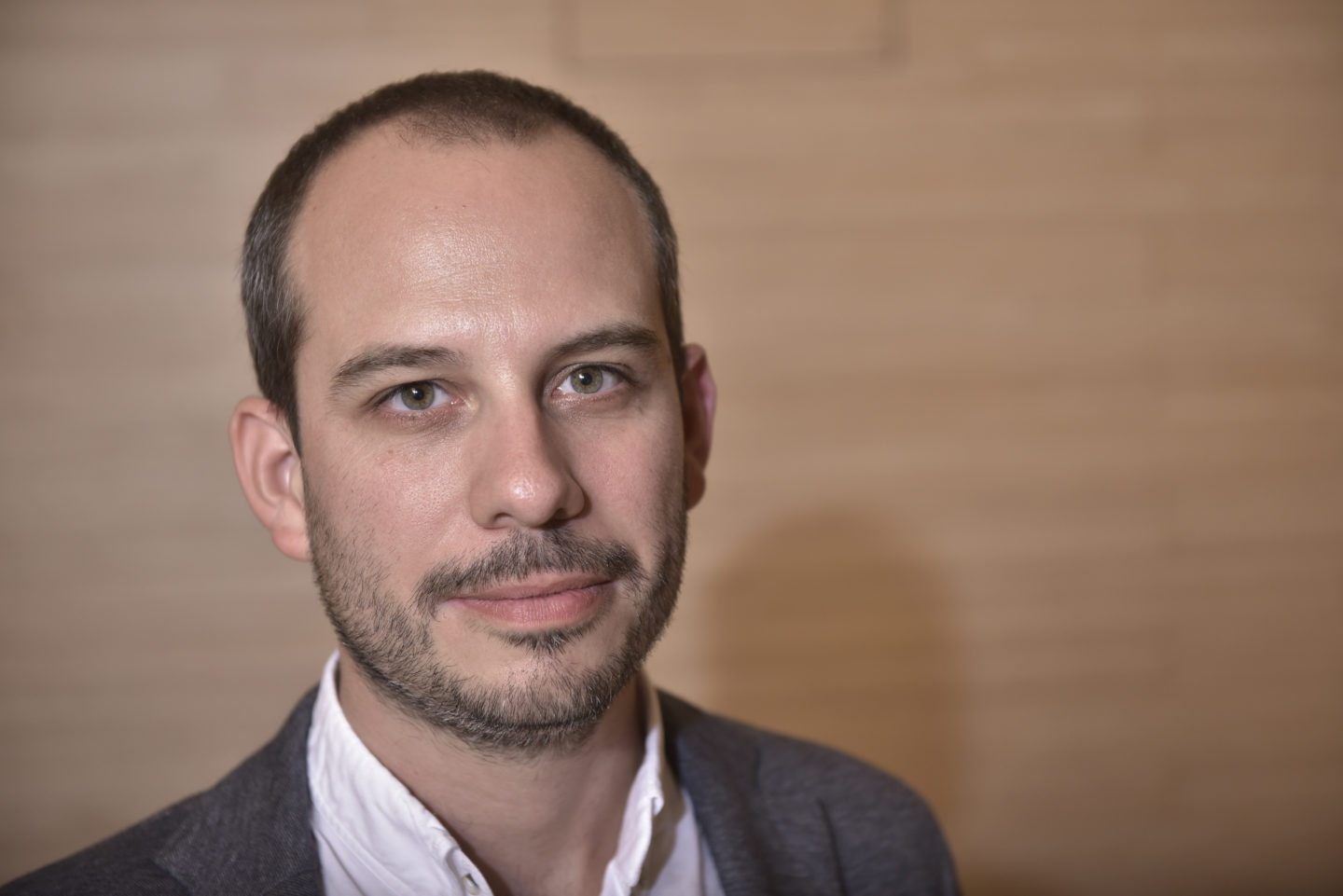
Vicent Botella-Soler was a Postdoc at IST Austria. He now works for ForwardKeys in Spain. ForwardKeys analyses global travel movements to help companies improve their tactical decision making. At IST Austria Vicent Botella-Soler was a Postdoc in Gašper Tkačik’s group.
In an interview with Daniela Klammer and Kathrin Pauser which took place during the Science and Industry Day 2017 he answered some interesting questions about his work.
Vicent Botella-Soler, Innovation and Machine Learning Manager at ForwardKeys
At ForwardKeys we analyze large datasets from the travel industry to provide forecasts and insights to our clients. We maintain a daily-updated database of all the flight bookings worldwide. The analysis of this large amount of data allows us to answer interesting questions in industry sectors such as retail, hospitality, tourism management or financial services.
It is very nice to have a sort of magnifying glass above the planet and watch, almost in real-time, how people move around and how different events and contexts affect the flow.
Limitations are all the typical limitations intrinsic to working with data…there are plenty of them, but these are the daily challenges you’ve got to get used to.
I see myself working on this kind of quantitative, analytic, data-driven problems. Also, I’ll make sure that I keep learning new skills and new techniques—that is what I find most exciting.
I studied theoretical physics and did a master in astrophysics. For my PhD I moved to dynamical systems and neuroscience. Here at IST Austria I worked in computational science, applying machine learning techniques to the problem of decoding visual stimuli from the spiking response of the retinal neurons.
Both through my work and by meeting and being in touch with very good scientists, I think I gained the skills and the confidence to be where I am now.
First and foremost, don’t put all your eggs in one basket. Make sure you give yourself plenty of possibilities and allow enough flexibility when you confront your future.
Always look around, talk to people in different fields and in industry, and also in different career paths. This way you can get a good idea of the context in which your career moves.
Also, it is very important that you trust your skills. Trust that the knowledge and habits that you have gained in science are valuable beyond the walls of academia.
When I came to IST it was still fairly small. It was very nice to go around campus during the first weeks and find that everybody just introduced themselves to you. It was easy to identify the newcomers and make them feel welcome.
And of course I met my wife here and my two kids where born while I was working at IST, so I keep many fond memories attached to the Institute.
It was mostly a family choice. We wanted to have a say in where we lived. So we chose where we wanted to live, and then our careers had to adapt to our decision.
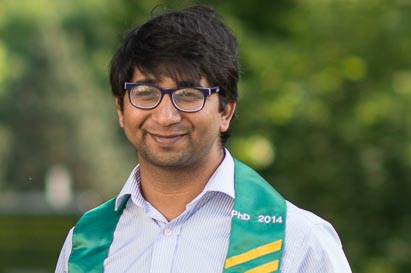
MY RESEARCH AREA RELATES TO USING PROGRAMMING LANGUAGES AND FORMAL METHODS TO HELP PROGRAMMERS AND DESIGNERS DEVELOP RELIABLE, SAFE, AND CORRECT SYSTEMS. IN PARTICULAR, I HAVE BEEN WORKING HEAVILY ON PROGRAM SYNTHESIS. HOWEVER, I’M INTERESTED IN ALL DOMAINS OF FORMAL METHODS AND RIGOUROUS SYSTEM ENGINEERING.
Arjun Radhakrishna joined IST Austria in 2009 as a PhD student in Thomas A. Henzinger’s group. His doctoral thesis on “Quantitative Specifications for Verification and Synthesis” won the ACM SIGBED Paul Caspi Memorial Dissertation Award. Currently, Arjun is a postdoctoral researcher at the University of Pennsylvania. We interviewed Arjun about his experience as a PhD student and about his transition to postdoctoral researcher.
I first became interested in computer science in high school when I learnt about programming. This was about 15 years ago, so the interest has always been there and has stayed with me.
I did my PhD right after my bachelor’s. After my bachelor’s I still felt that there were more things to learn than I already knew. I had the opportunity, so I decided to take it.
That was mainly because of Tom [Henzinger]. I did an internship with him when he was still at EPFL. I really liked the work I did during the internship and asked if I could work with him. He replied that he was moving to IST Austria so I decided to join him there.
It was really nice. We had a very pleasant group of people to work with. Something you come to appreciate is that the group you work with is just as important as the advice you get on your work. Tom is really good—there is no question about that. That is by the way another great thing about IST Austria, that the faculty is really good. We had advice available for whatever project we were working on.
We met about once a week on average. Meeting Tom once a week was really a privilege. Within a few minutes, he could understand exactly what I had been doing the previous week and could give me thoughts and advice that would guide me for the next week. He has this skill that many good researchers have of asking exactly the right questions that makes you think about the problem in the right way.
I also did a lot of work together with postdocs and we had a lot of fruitful collaboration together.
Paint, and I read a lot. Reading was my main hobby. My new year’s resolution every year while I was a PhD student was to read one novel a week. [Laughs] I never quite achieved that, but I read a lot. Two of my favorite authors are Milan Kundera and Terry Pratchett.
As a graduate student you’re mainly working on your research. But at IST Austria you also develop a way of thinking, which is much broader than what you get at a regular computer science or engineering department.
The great thing about being at IST Austria is that you get to meet people from a wide range of subject areas, such as computer science, life sciences, and mathematics. This broadens your mind.
At UPenn, I am at the school of engineering and applied science. I get to meet a lot of people who are doing cool engineering, and I didn’t have that chance before. That’s something different. There are also more students at UPenn than at IST Austria and this also gives me more opportunities to teach.
It’s definitely not smooth sailing. You struggle a bit, you have your ups and downs. But that’s what the PhD is about. You stay with it, and you persevere.
It’s really hard to give advice. Every student is different and every advisor is different. But I would say, perhaps try not to stick to just one problem but work on a few different problems. And as I suggested before, for a PhD student, much more important than any other quality is perseverance.
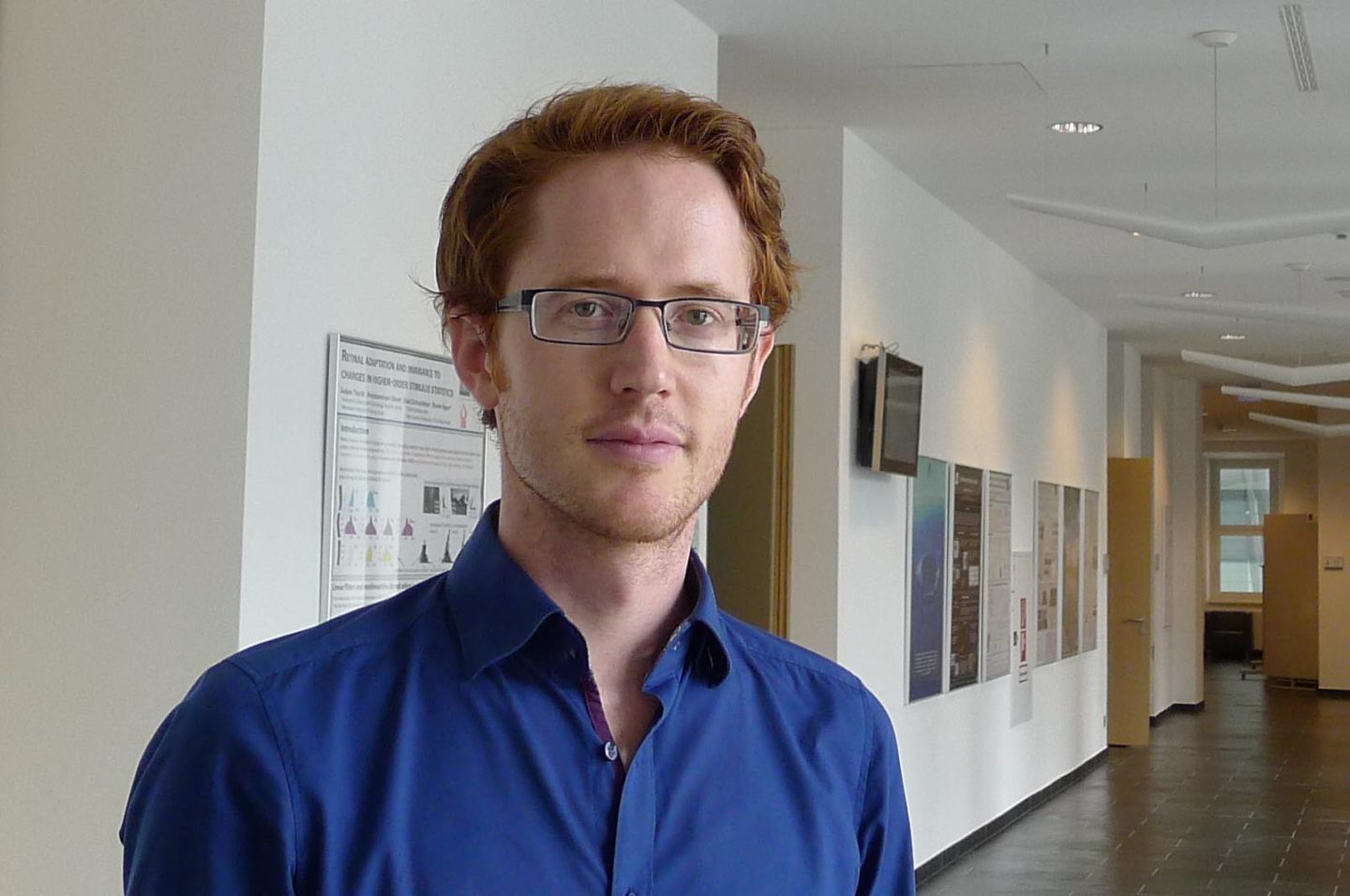
PRECLINICAL DRUG DISCOVERY IN NEUROSCIENCE WITH FOCUS ON ELECTROPHYSIOLOGY, OPTOGENETICS, AND DATA ANALYSIS
Philipp Schönenberger was a postdoc in the Csicsvári group from 2011 to 2015 before moving to his current position in industry. He is now a research scientist at Roche, a multinational healthcare company. He works in preclinical drug discovery in neuroscience with focus on electrophysiology, optogenetics, and data analysis.
During a visit to IST Austria in June 2017, he talked to Daniela Klammer and Kathrin Pauser about what it is like to be a researcher in industry, how he perceives the transition from academia to industry, and how to be successful in the job application process.
Also while on campus, he gave current students helpful tips on how to successfully apply to industry jobs during a special Think&Drink.
This is simple: “scientist”.
The coolest thing about my job is that we provide data that informs decisions about how to move ahead with projects. I like publications, but they can be the end of a story: everybody is happy, and you move on to the next thing. In our case, however, if we have data that is useful, it will be used later by other teams. This is very satisfying.
Somewhere around science, I think. I am a scientist at my heart, and now, I have seen more and more functions around science that are extremely interesting. So, while I don’t think I want to do experiments for the rest of my life, I want to be close to science. I particularly like this place between the preclinical and clinical development phases because it represents a major challenge in drug discovery. It’s a high risk transition, and if I can contribute to bridging that gap, then this is an enormous achievement as well as an interesting challenge.
I have a master’s in cell biology; in particular, I studied viral infections and the transport of viruses. Later, I moved into in vitro neuroscience in order to understand how neurons exchange signals. Then, it was a natural step to ask the same questions, but this time for the “intact” animal—in particular, to understand how neuron communication contributes to the formation of memories. That is essentially why I came to IST and chose to work with Jozsef.
It is here that I learned the concepts behind this kind of research, and gained the expertise necessary to perform it. It was absolutely fun, and also prerequisite for my current function. Plus, scientifically speaking, this kind of research is the most interesting thing you can do. My world view is still influenced by these experiences.
I encourage everybody to go to job fairs. I thought I was always too busy for that, and I don’t like networking. But I would still encourage everyone to do this. Even if you find out that something is not your cup of tea, then at least you know.
I think the difficult thing is the transition from academia to a place you don’t know. Industry was a big unknown—at least it was for me—but I now realize it was the same for most of my colleagues. Talking to people and networking helps a lot. That’s one thing I would definitely encourage.
And then, it’s not a bad idea to build up your CV a bit. Things like mentoring experience don’t hurt, a one- or two-day project management course can be helpful, too. All these things that you hear about, but usually ignore. When a company gets applications, they have a few things they want to see. It is so much easier when they know somebody has been exposed to industry, so they know the applicant knows roughly how it works and is interested. Your CV is what they use to make that first decision.
Internships help, I did one. Back then I was not specifically interested in disease, but during my master’s I did an internship in Cardiff in a group that works on Huntington’s disease. Of course I wrote that in bold letters on my cover letter. Why? Because a company looks for someone with not only the skills, but also the interest. Somebody who understands the questions behind the research. In a cover letter or CV, an internship is like a label: “I tried it, I liked it”. If you have a chance to do an industry internship, it is very valuable: it can be a door opener…and it can also make you certain that you don’t want to go into industry!
One specific event I remember is when—after a year and a half of work—my experiment worked for the first time. That is something I will always remember, first because it was really hard, and second because all these people said: “This can’t work, the physics almost forbids this.” This was a scientific “eureka” moment.
And then, I have many fond memories of sitting at the IST pond with my colleges and taking lots of time to discuss ideas in depth. I don’t have time for this now, and this is what I miss.
The diverse options—in the longer run—that you have in a company. For me, that was the most important factor.
Very simple! There are only a handful of labs in Europe that do this type of research, and Jozsef’s was one of them. He told me from the beginning that he was moving to IST, and I thought living in Vienna must be fantastic…I loved living in Klosterneuburg, it was a pleasure to be able to cycle to work and still be only 20 minutes from the city.
I saw the job and thought it sounded very interesting, and that it would be an excellent opportunity. Then, I contacted someone I know who worked at Roche, to get an idea of what they are looking for in an applicant. Later, they contacted me for a phone interview.
Practice a lot, and even rehearse for a possible video interview. While preparing, check things like the background, and make sure there would be good light, but for instance no window behind you.
Also come up with some questions beforehand. Don’t be passive! It’s good to show interest, and not only that, it is your chance to find out if this is the right job for you.
Research in academia and research in industry are both science on a high level, but in industry, research is far more cooperative. We have to work together: it is not only the group that has to succeed, it is the entire section.
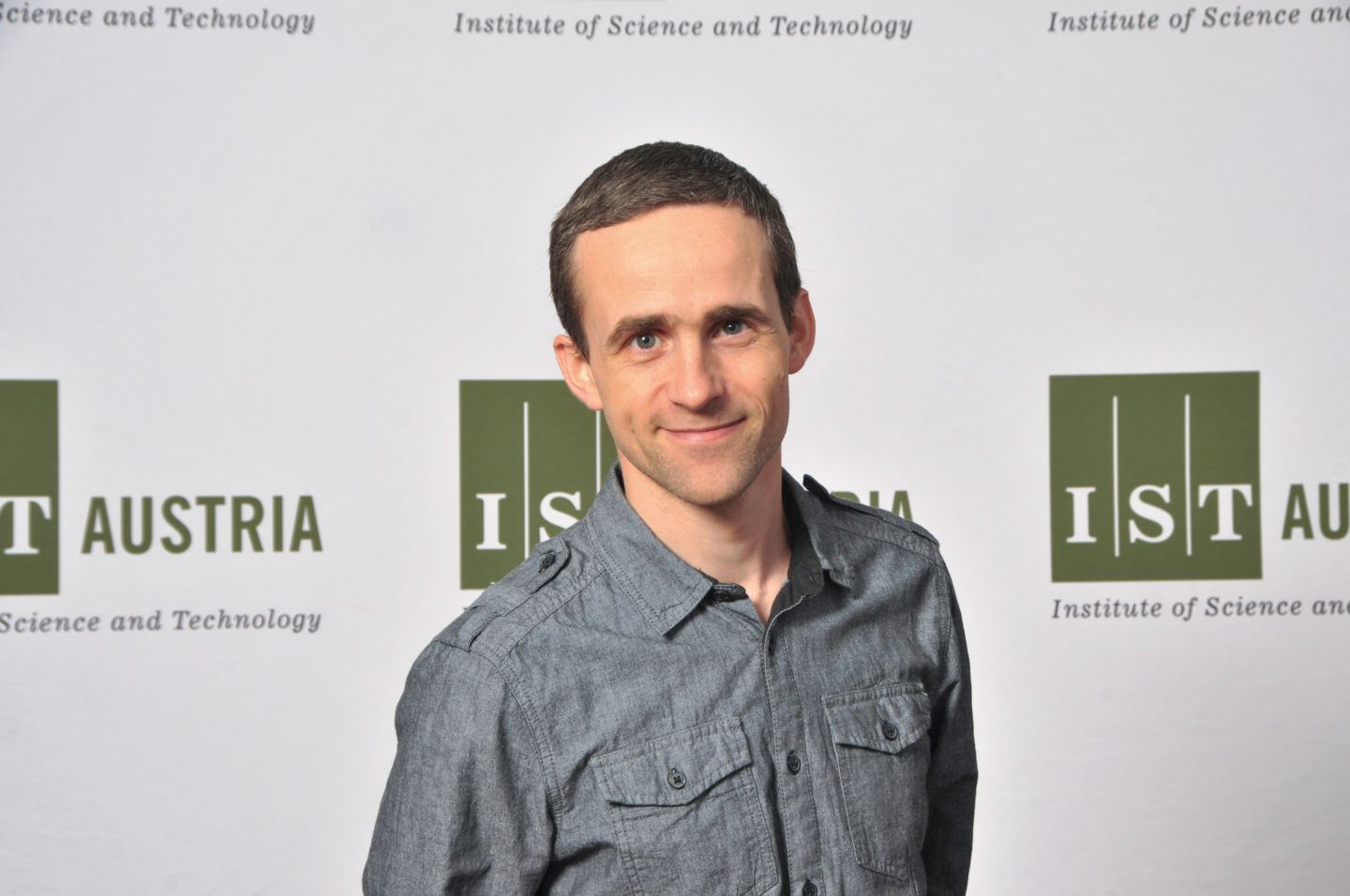
Stefan Jeschke is in the unique position of having left IST Austria and at the same time not having left the campus. He works now for Nvidia. Although the company which designs graphic processing units is based in Santa Clara California, Stefan Jeschke has rented an office on the IST Austria campus and works from there mainly communicating via skype and email with his colleges from all over the world. In an interview with Daniela Klammer and Kathrin Pauser he answered some interesting questions about his work.
Watch a short version of the interview here on youtube or read the long version below!
Stefan Jeschke, researcher at Nvidia.
Basically what I am doing is basic research, like I did at IST, I am working on realtime algorithms for future computer games.
I am very free in what I am doing, as long as it is exciting and interesting for my managers. Whenever I find something that excites me I can work on it as long as I want or until something cool comes out. I am very free at choosing my time to work, where I work and how I work. We have a very international community at nvidia. I am basically working with people from New Zealand, from Bangkok, all around the world and the US of course. It is an interesting environment to work.
No, it is all skype meetings and online.
Hopefully in the same job, if this works out. This is basically my dream job, I would say and I have no intent to change anything soon.
I have a classic academic career bachelor and master computer science, computer graphics in my case. Then I did a PhD in 2005, followed by quite a few postdocs in different universities: TU Vienna, Arizona State university in Phoenix, Arizona, then TU Vienna again and then IST until last year.
I learned a lot of new stuff here. The guy I was working with was Chris Wojtan he does physics simulations and I didn’t do that before too much. So I learned a lot from that perspective. He also introduced me to the job I have now. He made the connection for me so that was a very positive influence. I am still working with him quite a lot. So overall it is a very positive influence.
It was only like twenty steps, literally[laughs]my current office is only twenty meters away from my old office. Also was not such a big step because I still work in the same area I am still doing basic research as I did before. So in my case the difference is not that big but that might be very unique. I also have publications at the same conferences as before. I tend to pressure myself to publicize while my manager is more interested in demos for GTC but of course he also likes publications.
One advice is what worked out for me I didn’t think too much of a career to do but rather what I liked to do which was not too hard because in Austria all the contracts are short term anyways. Doing that what you like most at the moment is probably the best strategy to keep a healthy relationship to your job. Basically I never thought too much about long term because there are no long term perspectives for postdocs or similar positions in Austria. Just keep your focus on what you are doing now and do your best and go from there.
This is a hard question. I enjoyed the photography club we always had nice meetings. That’s one thing. Of course the scientific rewards are another, doing really great work and having great papers accepted at the best conferences – that is certainly something that I remember.
I had been at IST for some of the lectures and I think it was my wife that said, why don’t you apply there. What I liked is that there are only few students but those students are highly motivated and I liked that. That was one of the reasons to choose IST.
I would say it is pretty unique. As far as I know, I am the only employee in Austria at Nvidia and that was quite a struggle to get that but now I can work from where I want within Austria.
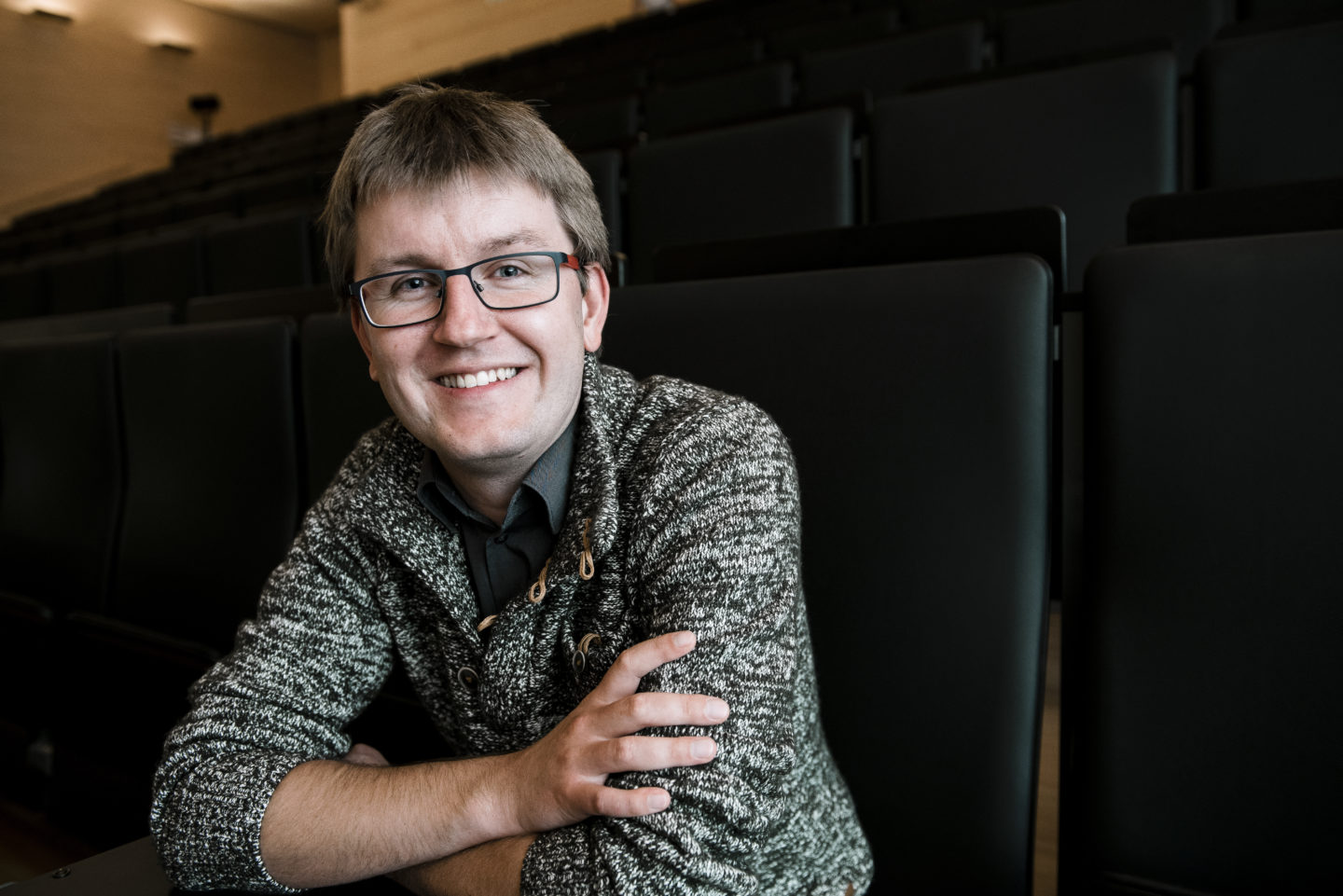
Martin Chmelik was a PhD student at IST Austria. He now works for TTTech. TTTech is the leading supplier of dependable networking solutions based on time-triggered technology and modular safety platforms. At IST Austria Martin Chmelik was in Krish Chatterjee’s group. His thesis with the title “Algorithms for Partially Observable Markov Decision Processes” won the Best Thesis Award at IST Austria 2016.
In an interview with Daniela Klammer and Kathrin Pauser, he answered some interesting questions about his work.
Martin Chmelik, research engineer at TTTech
I am working in a research group at TTTech and in our team we are building the very first versions of products. We are doing research in the area of scheduling, real time control and computation in hypervisors and building those into very early version of products that we then show to our potential customers.
The thing with computer scientists nowadays is that the challenges and opportunities are everywhere. So one doesn’t need to worry too much about the long term future and more on the current state and be happy with the work you are actually doing.
I did my masters at Masaryk University in Brno. I went to an Erasmus in Denmark in university of Aalborg and then I joined IST.
A very important one. There is some truth in the saying that you become the average of the five people you work most with. So in that sense, you should surround yourself with very smart and hard-working people. I think that IST was exactly the right place for me in that sense. So I think it played a very important role in my life.
The first one would be to enjoy your time at IST Austria and use everything that IST is offering. I think it is excellent environment and current students should make use of it.
Second, is to travel to conferences, to join workshops, organize events. Talk to people share ideas get new insights, be known in the community.
The third one is more general to ask questions. Because it seems to me at the moment when you don’t ask a question because you are afraid it is not a smart enough question then it actually accumulates. So from every first moment you should ask questions that are interesting for you.
This should probably be something like defending my PhD thesis or something like that. But actually form me it could be the table soccer tournament that took place annually. I was playing regularly but I never won. This kind of stays in my memory.